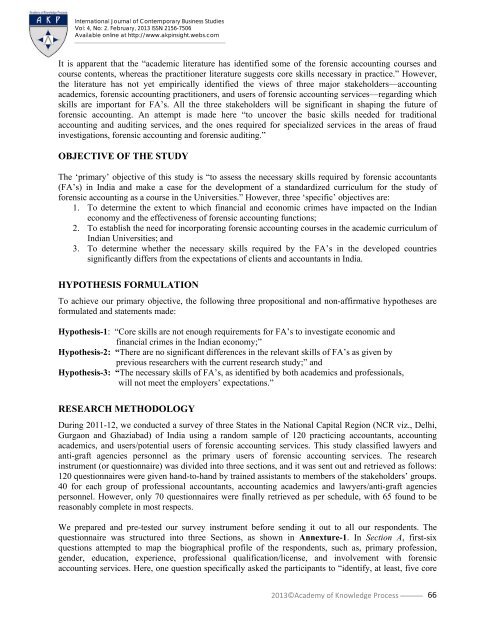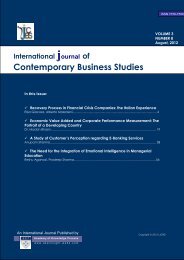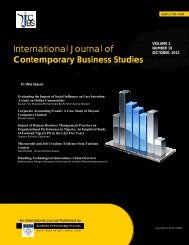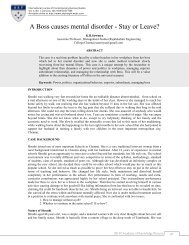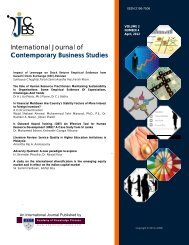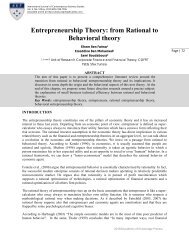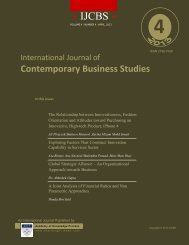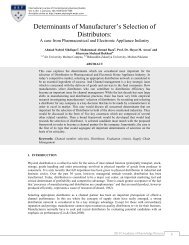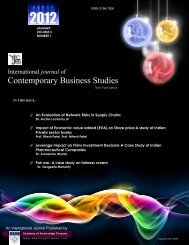International Journal <strong>of</strong> <strong>Contemporary</strong> <strong>Business</strong> <strong>Studies</strong>Vol: 4, No: 2. February, 2013 ISSN 2156-7506Available online at http://www.akpinsight.webs.comIt is apparent that the “academic literature has identified some <strong>of</strong> the forensic accounting courses andcourse contents, whereas the practitioner literature suggests core skills necessary in practice.” However,the literature has not yet empirically identified the views <strong>of</strong> three major stakeholders—accountingacademics, forensic accounting practitioners, and users <strong>of</strong> forensic accounting services—regarding whichskills are important for FA’s. All the three stakeholders will be significant in shaping the future <strong>of</strong>forensic accounting. An attempt is made here “to uncover the basic skills needed for traditionalaccounting and auditing services, and the ones required for specialized services in the areas <strong>of</strong> fraudinvestigations, forensic accounting and forensic auditing.”OBJECTIVE OF THE STUDYThe ‘primary’ objective <strong>of</strong> this study is “to assess the necessary skills required by forensic accountants(FA’s) in India and make a case for the development <strong>of</strong> a standardized curriculum for the study <strong>of</strong>forensic accounting as a course in the Universities.” However, three ‘specific’ objectives are:1. To determine the extent to which financial and economic crimes have impacted on the Indianeconomy and the effectiveness <strong>of</strong> forensic accounting functions;2. To establish the need for incorporating forensic accounting courses in the academic curriculum <strong>of</strong>Indian Universities; and3. To determine whether the necessary skills required by the FA’s in the developed countriessignificantly differs from the expectations <strong>of</strong> clients and accountants in India.HYPOTHESIS FORMULATIONTo achieve our primary objective, the following three propositional and non-affirmative hypotheses areformulated and statements made:Hypothesis-1: “Core skills are not enough requirements for FA’s to investigate economic andfinancial crimes in the Indian economy;”Hypothesis-2: “There are no significant differences in the relevant skills <strong>of</strong> FA’s as given byprevious researchers with the current research study;” andHypothesis-3: “The necessary skills <strong>of</strong> FA’s, as identified by both academics and pr<strong>of</strong>essionals,will not meet the employers’ expectations.”RESEARCH METHODOLOGYDuring 2011-12, we conducted a survey <strong>of</strong> three States in the National Capital Region (NCR viz., Delhi,Gurgaon and Ghaziabad) <strong>of</strong> India using a random sample <strong>of</strong> 120 practicing accountants, accountingacademics, and users/potential users <strong>of</strong> forensic accounting services. This study classified lawyers andanti-graft agencies personnel as the primary users <strong>of</strong> forensic accounting services. The researchinstrument (or questionnaire) was divided into three sections, and it was sent out and retrieved as follows:120 questionnaires were given hand-to-hand by trained assistants to members <strong>of</strong> the stakeholders’ groups.40 for each group <strong>of</strong> pr<strong>of</strong>essional accountants, accounting academics and lawyers/anti-graft agenciespersonnel. However, only 70 questionnaires were finally retrieved as per schedule, with 65 found to bereasonably complete in most respects.We prepared and pre-tested our survey instrument before sending it out to all our respondents. Thequestionnaire was structured into three Sections, as shown in Annexture-1. In Section A, first-sixquestions attempted to map the biographical pr<strong>of</strong>ile <strong>of</strong> the respondents, such as, primary pr<strong>of</strong>ession,gender, education, experience, pr<strong>of</strong>essional qualification/license, and involvement with forensicaccounting services. Here, one question specifically asked the participants to “identify, at least, five core2013©<strong>Academy</strong> <strong>of</strong> <strong>Knowledge</strong> <strong>Process</strong>66
International Journal <strong>of</strong> <strong>Contemporary</strong> <strong>Business</strong> <strong>Studies</strong>Vol: 4, No: 2. February, 2013 ISSN 2156-7506Available online at http://www.akpinsight.webs.comskills (out <strong>of</strong> 19 skill options) that FA’s needs to posses, and rank them on a 5-point Likert-type scale,ranging from 4 (strongly agree) to 0 (strongly disagree).” Similarly, in Section B, 9 skill-related broadstatements were presented being the important skills <strong>of</strong> FA’s. As suggested by DiGabrielle in 2008, “The9 skills required for the FA’s to be rated were: deductive analysis, critical thinking, unstructured problemsolving,investigative flexibility, analytical pr<strong>of</strong>iciency, oral and written communication, specific legalknowledge and composure. You are expected to answer them on a 5-point Likert-type scale, ranging fromranging from 4 (strongly agree), 3 (Agree), 2 (Neutral), 1 (disagree) to 0 (strongly disagree).” Moreover,in Section C, we asked the respondents to answer some questions regarding basic education and careerpaths<strong>of</strong> FA’s, their likely demand in the future—next 5, 10 and 20 years, and need to know computerbasedforensic techniques and s<strong>of</strong>tware tools.” The scales were anchored at each end with the descriptors“extremely unimportant” to “extremely important,” respectively. The responses from the above statedaspects <strong>of</strong> the survey instrument enabled us to assess participants views on the ‘core’ skills <strong>of</strong> FA’s, theextent <strong>of</strong> differences in views about these skills between current and previous research, and general trendsabout FA’s education, career-path, demand-supply scenario, and computer-pr<strong>of</strong>iciency.Some Universities in India are considering including forensic accounting courses to their curriculum. Thisevolution has unearthed an absence regarding the significant skill-set outcome that should accompanyforensic accounting education. One <strong>of</strong> the objectives <strong>of</strong> this study is to examine the necessary skills thatwill be required by would-be FA’s for the purpose <strong>of</strong> recommending them to Indian Universities forpossible inclusion in their syllabi. The current study complements the two prior-studies undertaken byRazaee, Crumbley and Elmore (2004, 2006) by surveying “forensic pr<strong>of</strong>essionals for their perceptions <strong>of</strong>the necessary skills and characteristics for FA, as well as the education requirements.”In conducting the data analysis, we used SSPS and Excel packages to compute descriptive statistics forgroup membership (tables <strong>of</strong> frequencies and percentages) as well as the responses relating to the 19competencies (both percentages within each category and overall means, standard deviations, variancesand ranges). Moreover, the correlations among the 19 items were also computed. The main set <strong>of</strong> analysesthat were followed consist <strong>of</strong> a series <strong>of</strong> one-way Analyses <strong>of</strong> Variances (ANOVAs) comparing the views<strong>of</strong> FA’s, academics, lawyers/anti-graft agencies personnel in terms <strong>of</strong> their ratings <strong>of</strong> the importance <strong>of</strong> allthe competencies. Specifically, the one-way ANOVA was used for testing hypothesis one, T-test fortesting hypothesis two and chi-square (x 2 ) for testing hypothesis three.DATA ANALYSIS, FINDINGS AND RESULTSA total <strong>of</strong> 65 respondents fully-completed the survey instrument, <strong>of</strong> them 20 (31%) werepr<strong>of</strong>essional/forensic accountants, 20 (31%) accounting academics, and 25 (38%) were users <strong>of</strong> forensicaccounting services. The overall response rate was 54 percent, which is little above the average score. Thedemographic pr<strong>of</strong>ile <strong>of</strong> the sample is as follows: approximately 70 percent <strong>of</strong> the sample comprised <strong>of</strong>men, 62 percent were over the age <strong>of</strong> 40 years, 93 percent were having undergraduate/masters’ education,77 percent were having experience with business forensics, 88 percent had experience with accounting,and 92 percent had experience with auditing, respectively.As stated earlier, our survey instrument (i.e., questionnaire) was divided into three Sections. In Section A,the list <strong>of</strong> choices provided to the participants was developed through an extensive review <strong>of</strong> the relevantacademic and pr<strong>of</strong>essional literature, consultation with forensic accounting practitioners, and users <strong>of</strong>forensic services. Based on the outcome <strong>of</strong> the current study, descriptive statistics for the 19 areas <strong>of</strong> skillcompetency, including the overall means, standard deviations, variances, and ranges are shown in Table5. It should be noted here that the “skills with the high means and low standard deviations are the mostimportant skills required for FA’s, while the skills with low means but high standard deviations are theleast important skills required to be FA’s.” Based on the findings <strong>of</strong> the present study, we can conclude asfollows: “The skill competency items rated as the most important were effective written communication2013©<strong>Academy</strong> <strong>of</strong> <strong>Knowledge</strong> <strong>Process</strong>67


